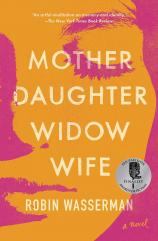Mother Daughter Widow Wife
Review
Mother Daughter Widow Wife
Following the 2016 release of GIRLS ON FIRE, Robin Wasserman returns with MOTHER DAUGHTER WIDOW WIFE, a propulsive, psychologically driven novel about a mysterious woman in a fugue state, the scientists who study her, and the daughter who longs for her.
Wendy Doe was found on a Peter Pan Bus to Philadelphia with no identification, no money, and no idea of who or where she had been before she boarded. Passing through a police station, a hospital, a mental facility, a shelter and finally a scientific institute, she is formally diagnosed with dissociative fugue, a temporary but all-consuming loss of memory and self. Her fugue could end tomorrow, next week or never at all, but one thing is certain: If and when she regains her memory, she will simultaneously lose all memory of her time in the fugue state. After seven weeks of fugue, Wendy agrees to submit herself for observation at the Meadowlark Institute for Memory Research, run by science prodigy Dr. Benjamin Strauss and his team of researchers.
Every year, Dr. Strauss invites four graduate students to spend a year researching their individual projects using Meadowlark’s labs, resources and opportunities. This year, his top student is Lizzie Epstein. Lizzie is still grieving the loss of her father, resentful of the proximity of her mother, and desperate to tie herself to something that matters. So when the alluring, enigmatic Dr. Strauss invites her to visit with Wendy, she is instantly enamored, not only of him and his brilliance but of the potential to reunite this woman with her memory, her family and everything she must have once held dear. She quickly takes the lead on this project and, rather than investigating the memories Wendy has lost, chooses to concentrate on the formation of her new memories and life. For Lizzie, Wendy is like an adult baby, ready to imprint and be imprinted on, but as she draws closer to the puzzle that is Wendy, her relationship with Dr. Strauss begins to morph.
"Wasserman keeps an intriguing distance between her characters and the reader, removing our ability to relate or sympathize with them, but putting in its place a sense of voyeurism or theatrics. As a result, the book feels fresh and unique."
The focus then shifts to Wendy’s daughter, Alice. But Wasserman flips the script a little in Alice’s timeline: We meet her years later, when a college-aged Alice has just lost her mother for the second time. Determined to find her, Alice shows up at Lizzie's door, hoping to gain more insight into the first time she disappeared. Lizzie, now going by Elizabeth, is still mourning the passing of her husband, Dr. Strauss. Alice knows that Elizabeth helped him examine her mother, but memory, she comes to learn, is a tricky animal, and one can never be sure what is real when digging up the past.
Jumping between perspectives and timelines, Wasserman unpacks for us the life of Wendy Doe, but also the lives of the women closest to her, and the ways that their connections to her allow them to explore themselves. Wendy is a fun, riveting character to read, as she has no memories and is more or less forming a new personality page by page. Free from the pressures of society and the knowledge that her body is hers and that it must be maintained, she is reckless and curious, biting and smart. She has little to no interest in recalling the life she once had because, as she explains, she cannot miss something she does not remember existing. Still, the question remains: Is she truly becoming someone new, or is she unpacking memories of her former self?
As Lizzie and, later, Alice, examine her, they too begin to develop in surprising ways, playing with their ideas of themselves and the ways they perceive one another. In Lizzie and Alice, we get different variations of the same journey, but neither woman is exactly relatable or endearing. Wasserman keeps them at arm’s length to let them define themselves, a choice that is equal parts successful and frustrating, as it is difficult to get through a novel with no one to really root for. But she crafts her plot carefully, and even from afar, the women are able to share their stories as they unpack the ways they fit into the roles society has given them: mother, daughter, widow and wife.
In MOTHER DAUGHTER WIDOW WIFE, Wasserman investigates not only the dichotomy of memory and choice, but also the ways that women might behave, act and treat themselves if they were not slotted into categories based on their relationships to men. Interestingly, the male characters are largely absent emotionally, allowing the women to stand alone to identify themselves, freeing themselves of labels and defining themselves through choice. This is an incredibly stimulating and brainy novel, but it is also compassionate and compelling, even when the plot gets a little ahead of itself. Wasserman keeps an intriguing distance between her characters and the reader, removing our ability to relate or sympathize with them, but putting in its place a sense of voyeurism or theatrics. As a result, the book feels fresh and unique.
Memory is a tricky subject on a normal day, but add to that an altered timeline and a character in a fugue state, and you get a plot that can often feel weighed down by its premise. Still, the leaps Wasserman takes in relating each woman’s struggle with identity make these moments worth the occasional head-scratching. This is a carefully plotted and well-constructed novel --- written in a tone that feels provocative and wicked --- and is perfect for readers of THE BOOK OF V., MOTHER KNOWS BEST and CATHERINE HOUSE.
Reviewed by Rebecca Munro on July 10, 2020
Mother Daughter Widow Wife
- Publication Date: July 13, 2021
- Genres: Fiction, Women's Fiction
- Paperback: 352 pages
- Publisher: Scribner
- ISBN-10: 1982139501
- ISBN-13: 9781982139506




